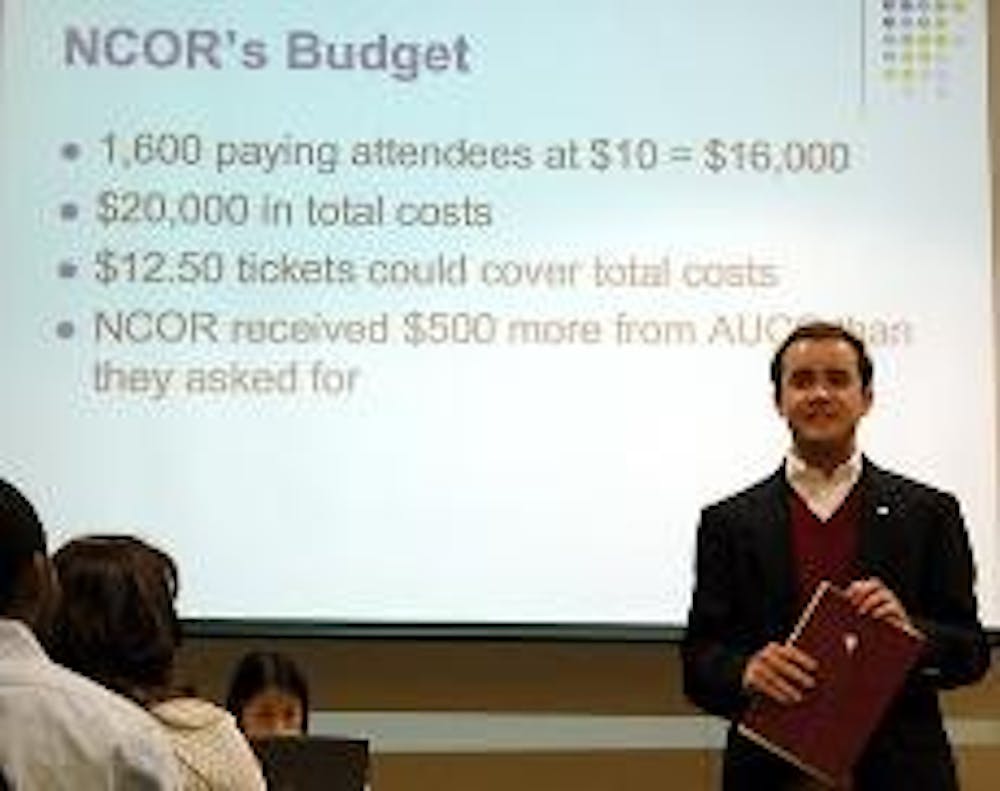The American University Club Council will not change its funding for the National Conference on Organized Resistance, which will take place over spring break.
The Residence Hall Association discussed the controversy over the university funding received by NCOR in a public meeting yesterday.
NCOR, the group Stop NCOR and the AUCC each made presentations defending their actions and explaining their agendas. The conflict was sparked by the AUCC's allocation of $4,500 to NCOR despite the conference's history of poor relations with students and $1,200 in damage incurred by the conference last year.
Elizabeth Sanders, a junior in the School of International Service, and Carni Klirs, a senior in the College of Arts and Sciences, represented NCOR, and said the group is addressing issues such as cleanliness and crowd control by creating a code of conduct for all participants, especially workshop leaders. According to them, a zero tolerance will be followed.
"I'm really hopeful that with the zero tolerance policy ... if someone is asked to leave [for breaking the code of conduct] it will set an example to the other participants," Sanders explained.
RHA held the meeting in response to an online petition circulated by Stop NCOR, which was signed by over 380 people.
In the petition, Stop NCOR claims AU should not continue to support NCOR because it is a national, rather than school-wide, conference. Additionally, the group claims, NCOR's continued presence on campus would tarnish AU's reputation.
"We believe NCOR should be treated like any other national conference that holds their event on our campus," said Rich Myslinski, co-founder of StopNCOR.com.
Myslinski cited events like the National Youth Leadership Conference, which must pay for campus facilities and maintenance.
Stop NCOR also said they believe NCOR crowds are a problem.
Sanders and Klirs explained the conference's history and association with the school. Originally called the National Conference for Civil Disobedience, it started with the student animal rights organization and only 100 people attending. Over the 10 years since it began, NCOR's attendance has grown to over 16,000 participants last year.
However, Sanders said conference attendance is not a problem.
"We're not looking to expand the conference," she said. "We understand that we've reached our capacity. We're even trying to hold back."
Mylinski and his Stop NCOR co-founder, Aldo Prosperi, also presented campus damages and student body concerns, such as attendees begging for meal swipes, sleeping in MGC and breaking into club meetings.
"If any other club incurred $1,200 [in damages] while holding a major event, I don't think the university would let them hold the event again," Mylinski said.
Through this debate, the AUCC has been accused of bias, as several of the council's members have participated in past NCOR conferences.
AUCC chair Josh Kramer attempted to clarify the situation at the meeting.
"There's only one member of NCOR on the AUCC and that's Elizabeth [Sanders], whom you've already met," he said.
Kramer also said those associated with NCOR have attended the conference but were not responsible for its organization.
Each club's yearly funding is based on the strength of its organization, which is evaluated every year, Kramer said. He said the AUCC decided to fund NCOR because it is capable of controlling its event and has new safeguards to maintain order.
"To say that they should take out a club when they've broken no AUCC rules, Club Council rules or university rules, it can't be anything other than politically motivated," said Josh Goodman, vice-chairman of the AUCC. "Any club that has an event will have extra clean-up costs and we accept that. ... Phil Bender probably costs the same and no one talks about canceling that because they don't find it politically offensive"





